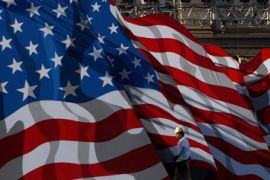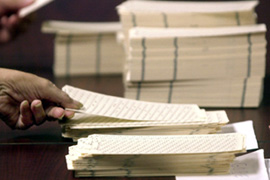Q & A: The US electoral system
A guide to how US voters choose their presidential candidates.

 |
| The US takes its democracy seriously [EPA] |
The US styles itself as the world’s leading democracy – but its presidential voting system is also one of the world’s most complicated.
That complexity is borne out of the US’s so-called “founding fathers'” fear of tyranny and the desire to protect the power of individual states.
It is also a system that has come under increasing scrutiny since George Bush’s controversial election win in 2000 after a supreme court ruling and amid allegations of corruption.
What are the primaries and caucuses?
The election gets under way with a series of state polls that enable voters from political parties to choose their preferred presidential candidate.
There are two types of primaries – open and closed.
| In focus |
In open primaries, a voter can take part in either one party or the other’s primary, but not both. Independent candidates can also take part in open primaries.
In a closed primary, voters can cast their ballot only within the party they have registered with.
However, each state’s electoral system is different, with some using caucuses, where parties hold local members meetings to decide their candidate.
Why are Iowa and New Hampshire so important?
|
Your Views |
|
What impact will the US presidential race have on your country? |
Iowa gained its “first in the nation” status after Democrats changed their party electoral calendar in 1972, with Republicans following suit in 1976, recognising the power of the media attention paid to the first voting for the presidency.
The first caucuses and primaries are crucial, with those candidates leading after the Iowa on January 3 and New Hampshire on January 8 gaining valuable early momentum.
Many of the eight leading Democrats and nine leading Republicans who fail to build support early on could drop out of the race.
The system has been criticised by those who believe that Iowa and New Hampshire have too much power for states that are unrepresentative of the ethnic mix in the US.
What is different in 2008?
 |
| Both parties will be hoping to avoid the recount that took place in 2000 [AP] |
In an attempt to cash in on the status of the early voting states, several states, including Florida and Michigan, have moved their primaries to earlier dates, provoking the wrath of the party leaderships.
The Democrats have said that any other states which move the date of their primary or caucus will lose their votes at the party’s conventions and the Republicans are believed to be considering a similar move.
What is ‘Super Tuesday’?
Normally held in the first week of March, the early primary calendar in 2008 means the big day for the leading candidates is now on February 5.
At least 20 states will hold their primary and caucus polls, with those coming out on top normally selected as their party’s candidate for the presidency.
When are the party candidates finally selected?
Candidates are finally selected at the party conventions, where delegates will officially cast their votes for the candidates decided on by party supporters during the primaries.
The Democrats will hold theirs in Denver, Colorado, on August 25-28.
The Republicans will be in Minneapolis-St Paul, Minnesota, on September 1-4.
What is the electoral college?
The US presidency is not decided by a popular vote, but by state electors who normally all vote for the candidate who gets the most votes in the popular poll.
Each state has the same number of electors as it does congressmen and women so, for example, California has 55 electors, Texas 34 and Wyoming three.
The next president of the United States needs 270 votes to win.
It is possible to become president despite losing the popular vote, as Al Gore found out when he lost to George Bush in the 2000 poll.
When is it all over?
The US votes for a new president on November 4, 2008.
